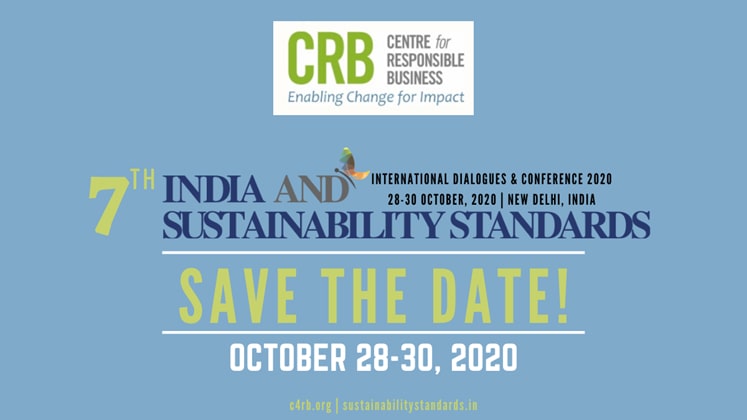The 7th edition of Centre for Responsible Businesses (CRB) flagship Annual Conference, ‘India and Sustainability Standards 2020’ (28-30 October 2020) concluded successfully.
Over 800 practitioners from across the globe came together for the conference.
This year’s event ended with the hope, with specific take-aways and most importantly desire amongst many to create and tread on ‘pathways to sustainable, inclusive and green recovery for India’ post COVID-19.
While there were some uninitiated, most of the participants were sustainability enthusiasts and were steadfast in their belief that promoting sustainable business, markets and societies is possible and is critical.
Well, they are not alone – around the world, an increasing number of scholars, practitioners, consultants, public figures, political leaders have embraced sustainability – and the need for us to value and preserve, nature – people – societies.
Inaugurating the conference, Suresh Prabhu, India’s Sherpa to the G7 and G20 and former Minister of Commerce & Industry, reminded that the end of lockdown should be an opportunity to relinquish old ways of doing things.
The world has been in a lockdown all this while he opined by pursuing an unsustainable development path, and not been able to come out of it for decades. The end of lockdown, whenever that happens, should help all to come out of this old way of thinking and actions, and start afresh.
He added “We should lock-in old habits and unleash for ourselves new ways of thinking and action.”
The 3-day conference brought together over 200 speakers from across the world. Dr Rajiv Kumar, Vice-Chairman of NITI Aayog; Dr Yasmin Ali Haque, UNICEF Resident Representative India; Ashwini Chhatre, ED, Bharti Institute of Public Policy (Indian School of Business); Dr Bimal Arora, Honorary Chairperson of CRB and faculty at the Aston Business School; Rijit Sengupta, CEO of CRB to name few.
The experts dissected and discussed a number of critical sustainability issues across the 28 thematic and sectoral sessions.
Like every edition, this year’s conference also has experts from the textile and apparel industry who also shared their opinion in various sessions. “Circular Design in Apparel: Enabling Circular Economy for Business Resilience” was also discussed in detail.
In various sessions, Dinesh Mehra, Richa Global Exports, shared how they work a lot on the counselling of the workers on various issues and it pays to them. There are a lot of challenges regarding worker’s perception.
Sumit Gupta, Head of Quality Assurance & Implementation, Global Organic Textile Standard (GOTS) highlighted that GOTS works in both social and environmental domains in the field of organic textiles.
The contributions to India include economic benefits to workers and exporters, the health of farmers and workers, treated wastewater before discharge, elimination of hazardous substances, etc., which is practically covering the whole range of UN Sustainable Development Goals (SDGs).
For detailed coverage of the conference, please see the upcoming December edition of Apparel Online India magazine







